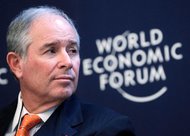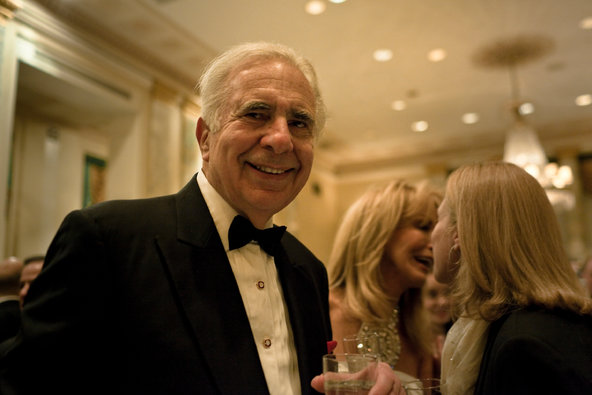 Denis Balibouse/ReutersStephen Schwarzman, chief of the private equity firm Blackstone Group.
Denis Balibouse/ReutersStephen Schwarzman, chief of the private equity firm Blackstone Group.
Leon Cooperman, the billionaire investor and longtime Wall Street denizen, was railing on Monday about the deal of the moment: Michael Dell’s $24 billion effort to buy out the troubled computer maker he founded.
“Management-led buyouts are a giant case of inside trading by management against their own shareholders,” Mr. Cooperman told me, continuing: “Dell has a moral responsibility to work for his shareholders.
“He’s not doing this because he thinks his company is overvalued. He wants to make money.”
The battle over Dell, which turned into a three-way tug of war over the weekend with the addition of competing bids from both the Blackstone Group and Carl C. Icahn, has put into focus the question — and perhaps the answer — of whether management-led buyouts are good or bad for shareholders.
DealBook Column
View all posts
Unlike Mr. Dell’s offer, in which he joined with Silver Lake Partners to take the company out of the public markets, Blackstone and Mr. Icahn proposed deals that give public shareholders the option to cash out or to continue to own a stake.
“We see no reason that the future value of Dell should not accrue to all the existing Dell shareholders — not just Michael Dell,” Mr. Icahn, always bracing for a fight, said in a statement.
The thinking among some shareholders has been that Mr. Dell must know something that public investors don’t — and that his deal is an effort to buy the company on the cheap and sell it back to the public for even more money in a couple of years. As Ben Stein, the market observer, wrote in Barron’s recently, “These insiders know far more about the company’s value than we little fish.”
David Einhorn, the hedge fund manager, went so far as to suggest, perhaps cynically, that the swoon in Dell’s stock price in the second half of 2012 may not have been unwelcome inside the company.
“Michael Dell probably didn’t mind the stock falling,” Mr. Einhorn said on a conference call with investors recently. “For him, it created an opportunity. Now, he wants to take Dell private, and voilà!”
Comments like Mr. Einhorn’s reflect a shifting ethos on Wall Street, one that might be slightly less short-term greedy than that of previous generations of investors who typically would have taken the money offered as part of leveraged buyout and run. It appears that some shareholders of companies involved in buyouts would prefer to ride a wave of gains alongside the buyout kings rather than cash out immediately.
Southeastern Asset Management, one of Dell’s largest shareholders, which has declared it would block Mr. Dell’s original offer, said it was “pleased that the alternative proposals submitted to the Dell Special Committee are structured to give shareholders the opportunity to continue to participate in the company’s future prospects, while also providing a higher cash component for shareholders who choose to exit their investment.”
In fairness, it must be said that Southeastern is severely underwater on its investment in Dell — it bought its shares at an average price of $16.90 — so it has little to lose by taking this position.
But the offers by Blackstone and Mr. Icahn (his offer is being taken less seriously by the market) reflect the shifting mood of long-term investors by offering them a seat at the table and could become a trend in the way private equity firms approach buyouts in the future.
Mr. Dell has indicated to executives inside Dell that he is open to working with Blackstone, people close to him said on Monday, perhaps jumping ship from Silver Lake if Blackstone’s bid is deemed superior.
Both of the new offers open up the possibility of all three bidders buying a majority of the company, while leaving a small minority of shares — called a stub in Wall Street parlance — in the public market. In some ways, the shift is an ironic about-face for private equity firms, which have long evangelized on the merits of taking companies private that are in need of a turnaround and have spoken derisively about the pressures of the public markets.
Stephen Schwarzman, the co-founder of Blackstone, told Businessweek back in 1996 that C.E.O.’s are “not able to do some of the things they know should be done to fix their companies. If it requires their earnings to be depressed for two or three quarters or write-offs, they’d rather, in many cases, not do the right thing, because if they do the right thing, they’ll be penalized by their shareholders.”
When Mr. Dell made his bid to acquire his firm in February, with the backing of Silver Lake Partners, he made it clear that he, too, believed that it would be better to work on a turnaround of the company behind closed doors.
“Dell has made solid progress executing this strategy over the past four years, but we recognize that it will still take more time, investment and patience, and I believe our efforts will be better supported by partnering with Silver Lake in our shared vision,” he said in a statement.
Now that Blackstone and Mr. Icahn have emerged with preliminary stub offers, Mr. Dell may have to get used to executing his strategy in the daylight as a semipublic firm, with all the requisite disclosures that he was trying to avoid.
As for whether Mr. Dell was trying to steal the company from shareholders, if the battle for the company proves anything, he may have helped shareholders rather than hurt them. (And frankly, it may hurt him in the end, for it is possible he may inadvertently lose control of the company by trying to take it private.)
Forgotten in the war of words over this transaction is the fact that Dell’s shares traded at about $8 just four months ago. (They closed at $14.51 on Monday.)
It is a personal computer company at a time when tablets and mobile computing are the new thing. It is hard to argue that Dell is not in deep, deep trouble, after it reduced its forecast for fiscal 2013 from $5.6 billion in operating income over the summer to just $3.7 billion in January. People close to the company say that it is expected to reduce its forecast to $3 billion this week.
And while Blackstone’s bid is worth $14.25 a share, that’s just 60 cents more a share than Mr. Dell’s offer of $13.65, hardly a robbery.
To its credit, Dell’s special committee and its advisers did a herculean job of pushing to bring in new bidders with higher offers, especially since most observers — including this columnist — considered the deal with Mr. Dell to be a fait accompli. And, in truth, most “go shops” — a provision of some merger agreements that allow companies to continue shopping themselves after agreeing to a deal — are considered simply an artifice.
For shareholders of Dell, the ultimate test of the deal’s success or failure won’t be in the coming weeks and months when a final victor is chosen by the company’s board. The verdict will be in the value of Dell in five years from now and whether the current public shareholders have profited.
But shareholders beware: Back in 2007, two private equity firms sought to take Clear Channel, the radio and outdoor advertising company, private. Some shareholders balked and said they wanted to be able to participate in the upside of the deal, fearing that the offer price was too low and the “smart money” must have a secret plan.
The shareholders got what they wished for: the private equity firms revised their offer to allow shareholders to keep their stake. And what happened to its value? It has dropped nearly 84 percent.
Article source: http://dealbook.nytimes.com/2013/03/25/obligations-and-motivations-in-the-battle-for-dell/?partner=rss&emc=rss


